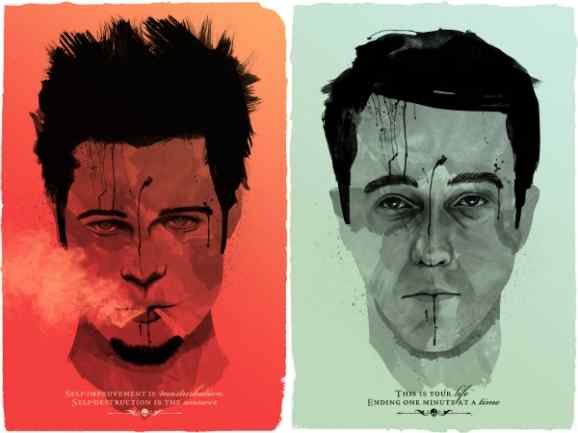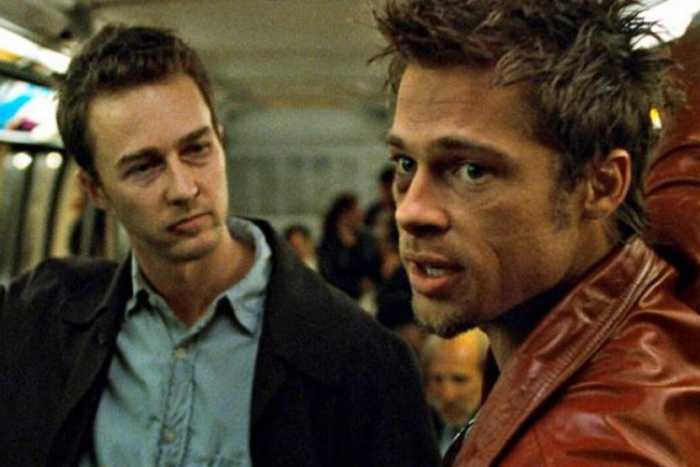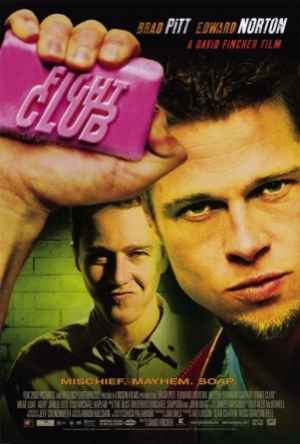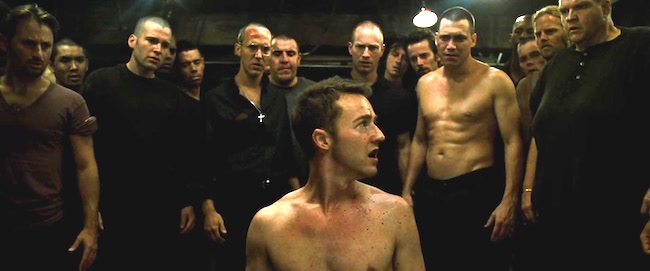Fight Club: Consumerism, Anarchy, And The Search For Purpose

In the context of an individual entity like a human, there is nothing inherently objective when it comes to the idea of purpose. Having an awareness of this can certainly seem like a positive thing given how much individual freedom it grants a person as opposed to something more objectively finite at birth. At the same time though, it’s important to recognize the reverse side of this revelation and how it essentially paints a portrait of anxiety that has essentially defined the whole of a society that is often overwhelmed by the burden of having too many options, so much so that it essentially makes the embrace of self-destructive/nihilistic impulses more apparent and even normalized rather than confusing.
“Find some cause”
– Narrator Fight Club
Those with enough self-awareness pertaining to this reality can either become very depressed or merely immensely cynical when it comes to their confrontation with life. Fight Club can’t necessarily make the case for free will given how much so many of the decisions we make in our lives are based on circumstantial matters that have occurred while equally predating our existence or merely just the occurrence of the momentary reaction prompted by them.

However, the idea and ambiguity pertaining to the concept of free will has very much permeated the intellectual rigor of our culture so much so that it has gravitated towards accepting the idea that despite the idea of free will merely being an idea, it still refrains anyone from denying that we as individuals still have the freedom to choose how we respond to the things that happen to us. In the case of the nameless narrator—who for the sake of honoring the newly adopted Fight Club analysis tradition of calling him Jack (Edward Norton)— he loses everything or at least every material possession he associated with the identity he convinced himself was real and a means of self-determination, and this leaves him both hollowed out and perpetually empty for a period of time. But it’s like the prolific and charismatic Tyler Durden (Brad Pitt) said, “ “The things you own, end up owning you,” which couldn’t be a greater stab to the cancerous tumor we now recognize as consumerism. Now, owning something or even wanting a material possession isn’t necessarily bad. However, when a culture as fixated on material consumption as that of the West is, it almost devolves into the kind of epidemic that we don’t address but instead find new ways of supplementing as if that were to give us meaning and clarity rather than just adding more blindness to the very slavery that defines our system.
All this rhetoric and criticism of capitalism are what have painted Tyler Durden as a modicum of individualism for male fans of Fight Club to model themselves after. Granted, when looking more closely at the film and the way it analyzes the religious nature of the Fight Club and Project Mayhem phenomena, it only delves into more complex territory when deconstructing how misread the film is in terms of its true meaning.
“You’re not your job. You’re not how much money you have in the bank. You’re not the car you drive. You’re not the contents of your wallet. You’re not your fucking khakis. You’re the all-singing, all-dancing crap of the world.”
– Tyler Durden Fight Club

As insightful and honest as this remark is, it can still be very easy for anyone who agrees with Tyler’s critique of the capitalistic model that has led to so much sociological self-destruction that it essentially breeds a new form of collective religiosity as opposed to the rugged individualism that his anti-consumerist rhetoric espouses. This all goes back to Fight Club, and although it provides an avenue for treating the very repression most men face in today’s world given that a lot of it has been defined by the confirmative social model where it is more important to get a steady paying job from a corporate entity, forming a family, and essentially complying with the rules of a debt-ridden economic system that perpetuates happiness, respectability, professionalism, and even individuality (LOLFL), then all you have is another trade-off rather than an actual solution.
As much badassery can be attributed to the rules of Fight Club; “The first rule of Fight Club is: you do not talk about Fight Club. The second rule of Fight Club is: you do not talk about Fight Club! Third rule of Fight Club: someone yells stop, goes limp, taps out, the fight is over. Fourth rule: only two guys to a fight. Fifth rule: one fight at a time, fellas. Sixth rule: no shirts, no shoes. Seventh rule: fights will go on as long as they have to. And the eighth and final rule: if this is your first night at Fight Club, you have to fight,” the charismatically delivered rhetoric of Tyler is really no different than the thematic flare a hyper-energetic preacher or motivational influencer has on a mass audience that has either been bought into their subtly depicted sales pitch or have essentially convinced themselves that they have found “The Answer” or whatever a person believes will be the solution to the many problems that perpetuate and ultimately define their life as an individual. Then again, one of the more brilliant things about Fight Club is that along with its critique of both capitalism and the dangers of adhering to any counter-revolutionary narratives of rebellion—which can all take on an extreme of their own—is that it essentially presents the question as to what is individualism in our modern age.

On a basic level, the term individualism is defined as “the moral stance, political philosophy, ideology, and social outlook that emphasizes the intrinsic worth of the individual,” and that outlook can be attributed to a character as brash and independently thinking as Tyler Durden. However, even though several of the key points he makes do have a sense of clarity and accuracy, they hardly detract from the more contradictory nature of his collectivist views where he pretty much refers to every member of Fight Club/Project Mayhem as “You are not special. You are not a beautiful or unique snowflake. You’re the same decaying organic matter as everything else.”
From a purely biological level, Tyler is correct to point out what human beings are made of. But given the self-importance human beings attribute to their individual personas, the prior remark essentially invalidates the individualism he espouses as part of his anti-capitalist/anti-consumerist views. Anyone who has seen Fight Club is familiar with its twist reveal of Tyler and Jack being the same person. At the same time though, the fact that Tyler is an embodiment of everything the Jack’s subconscious wanted to be very much how many people often imagine a better version of themselves is itself an intriguing way of looking at the purpose of Fight Club and the intentions of writer Chuck Palahniuk who stated that “Fight Club” “was a lot of psychodrama and gestalt exercises that would empower each person. Then, ideally, each person would leave Fight Club and go on to live whatever their dream was — that they would have a sense of potential and ability they could carry into whatever it was they wanted to achieve in the world. It wasn’t about perpetuating Fight Club itself.’“

Aside from the reactionary effect Fight Club has had in inspiring the formation of multiple real-life Fight Clubs across the United States, the fact that Tyler Durden’s popularity has operated as a form of radicalized individualism is itself a deeper statement in regards to the nature of the very psychological frustrations explored both in the novel and the film. These mentioned frustrations pertaining to masculinity, a dissatisfactory work culture, and the consumerism that acts as a comfort apparatus are essentially the factors in that author Chuck Palahniuk tackles. In a 2021 Joe Rogan podcast interview, Palahniuk discussed how he enjoys making people uncomfortable through his work, and although this remark can be centered on a sadistic or malevolent urge, it’s much more intellectually honest in analyzing the deeper discussion at hand when looking beyond the author’s intention of creating a level of discomfort for the person that works more as a form of deconstruction with the sole purpose of tearing down the individual and essentially helping them rebuild themselves with the much-needed essentials. In many ways, this act resembles the very trials and tribulations that Jack experiences when losing the apartment he had filled with so many of the very superficial material possessions he deluded himself into thinking would complete him. But as Tyler Durden said, “Only after disaster can we be resurrected. It’s only after you’ve lost everything that you’re free to do anything. Nothing is static, everything is evolving, everything is falling apart.”
When looking at the culture of conformity and over-indulged comfort that the quasi-religious impulse of consumerism has generated, it only unravels a truly horrifying reality regarding the degeneration of a multitude of generations that have become more subservient to any institutionally promoted mode of complacent conformity, or a more generally crafted form of mediocrity that essentially crushes any sense of identity or even spiritual fulfillment. It would be relatively easy to see the impact and phenomenon of the fight club depicted in the film as an avenue for the kind of toxic masculinity that often paints men as either abusers or much more susceptible to violent power grabbing. However, by looking closely at the fights that take place within the fight club and the narrator’s observance, the release the men in the fight club receive from their participation in the fights serves as the kind of release that carries an almost sexual but equally spiritual fulfillment that modern life failed to provide for them. If anything, the purpose that Fight Club serves for its members is that of a spiritual fulfillment that their professions, their consumerist vices, and even their false notions of masculinity in a de-masculinized culture have failed to deliver.

Fight Club isn’t presented as the answer so much as an indicator as to what men in our modern generation are currently seeking as opposed to filling the void formed through the overabundance our modernity has provided. As much as several groups be it social justice warriors or any organizations that champion minority groups undergoing a particular form of systematic oppression argue about how unfair life is, on a basic level, things have essentially become much easier from an industrial and technological level. However, despite how someone like Steven Pinker will argue that things have gotten better, the downside of this evolutionary component has led to an overabundance of many commodities, be it food or comfort that has essentially eliminated the spiritual essence that gave people a sense of meaning or even the overall wholeness that comes with being part of something bigger than yourself, or even working hard for something that truly lasts for a moment of what we can often interpret as perfection..
Narrator:
When people think you’re dying, they really, really listen to you, instead of just…Marla Singer:
– instead of just waiting for their turn to speak?
Jack suffers from insomnia, and after countless attempts to cure it, he eventually stumbles upon the solace he derives from frequenting support groups. This discovery essentially turns from a spiritual cure to that of an unnerving addiction where these various support groups he frequents; be it men suffering from testicular cancer, melanoma, or some depressive disorder only highlight the spiritual emptiness that defines him and the blindness that characterized the materialistic consumption that defines many consumers in the United States. In Jack’s case, his consummatory habits essentially failed him to a point where he saw no other option than to seek out some form of unconventional human connection, even if it meant “I let go. Lost in oblivion. Dark and silent and complete. I found freedom. Losing all hope was freedom.”
It is this admittance of a loss of hope that gives Jack a sense of peace, and although it started with the support groups, it only becomes more apparent in his formation of Fight Club, and how it provides the same function for the many spiritually disposed members who join it. Sadly these same men who find a sense of fulfillment in discovering the liberation that gives Fight Club its hyper-individualistic release ultimately fall prey to the more collectively oppressive mindset that defines the pseudo-anarchic mantra of its evolution into the terrorist-oriented approach Project Mayhem fully embraces.

Despite Project Mayhem’s supposedly noble intention of destroying the same economic-financial system that for decades has not only crippled the middle class across the United States with excessive money printing, debt expansion, and ridiculous taxation, it has also created the very avenues of the same emptiness that creates this highly materialistic/status-based culture that has done nothing but further create the same cultural disparity Tyler Durden believes is a spiritual war that nobody with proposed solutions ever tries to win so much as put a bandaid on. The absurdity of these patterns is replicated within the mentality of the Project Mayhem members, who pretty much forfeit the very individualism that they were convinced Fight Club offered in its genesis.
As a narrative, Fight Club is many things. It’s dark, violent, graphic, self-explorative, and outright f-ing hilarious when it comes to its twisted overview of all the flaws that pervade and characterize a highly socialized culture we treat as if it was normal or sane. But in its ability to use a character as charismatic and yet equally terrifying as Tyler Durden, in contrast to the often hopelessly empty Narrator (Jack) and even the nihilistically comical Marla Singer (Helen Boham Carter), it manages to challenge many of the social and societal norms that have been forced on individuals and to an extent that instead of being complacent, they confront them through the kind of self-examination that only gives more weight to Tyler’s line “How much can you know about yourself? You’ve never been in a fight. I don’t wanna die without any scars. So come on; hit me before I lose my nerve.”
“There are times when those eyes inside your brain stare back at you.”
– Charles Bukowski
What do you think? Leave a comment.











Tyler’s right when he says the stuff you buy owns u. My PS5 broke last week and I was literally losin my mind like I didn’t kno what to do wit myself.
Tyler Durden’s anti-consumerist rhetoric mirrors the alienation that Marx warned about, where workers become estranged not only from the products they create but from their own essence as human beings.
Honestly, I don’t get why they fight so much. Sure, life is hard but hurting each other?
Great work. I appreciate your nuanced exploration of free will, but I would contend that the film subtly leans toward determinism, particularly in its portrayal of Jack’s psychological descent. Freud’s theory of the unconscious mind is particularly relevant here, as Tyler Durden represents the id, while Jack attempts to repress these primal urges within the confines of societal norms.
Fight Club is sick! I love it.
I found the part about spiritual emptiness so relevant to our generation.
Yeah. We’ve replaced meaning with scrolling through social media, constantly comparing ourselves to other people’s highlight reels.
I like your treatment of existential freedom, but I would have liked to see more engagement with existentialist philosophers like Sartre and Camus. Tyler’s rejection of societal norms echoes Sartre’s idea that ‘existence precedes essence’.
Sometimes it feels like life is too boring and u wanna do something wild just to shake things up.
Join. THE CLUB.
I loved this movie on its first release, it felt like the curtain had been lifted and the truth revealed. Upon rewatching a few years later I revised this opinion, deciding instead that it was a lot of whining narcissistic butt-hurt bro-tastic nonsense, summed up by the scene in which Pitt rants about the emasculation crisis due to “a whole generation of men raised by women” (as opposed to what, a generation of men raised by bears perhaps?). However, recently I watched it again with my now late-teen and 20-something kids and realised how hilariously funny it is – don’t take it too seriously and it’s a great movie.
You should watch it again and watch the youtube video of Whatisantilogic? first. It opens it up again on a whole other level. If you knew the film went this deep without reading the fan theories then congratulations you are officially Jack’s best personality.
It’s been some years since I watched Fight Club; but I remember the first time I saw it, I did NOT see the Norton/Pitt plot twist coming, until it was in-your-face-obvious… And honestly, the ending, well – was it real? Or just another illusion?
I remember at college around 2001 my mate raving about it and treating it like basically the best film ever. He really went on and on about it, so copied his excitement as I was glad he enjoyed the film that much. But I thought it was overrated back then and found it mediocre.
It’s trying too hard, I think that was it’s problem then and now. Like most of Chuck Palahniuk’s work, frankly, as subsequent books like Lullaby try desperately hard to be so very cool. I guess that’s the point of his work, it’s supposed to make angsty young lads think they can stick it to the system. My mate ending up working in a prison.
So, yeah, I tried very, very hard to enjoy the film 20 years ago. I’m not trying again.
Few films divide opinion like this one. I take it as one of the worst ever made. Shallow, dumb and struggling so hard to be cool but failing miserably. And Brad Pitt is a lousy actor, especially when placed next to Ed Norton.
Someone’s got to say it… This article violates the First Rule.
You don’t talk about Fight Club……except for publicity.
Fight Club’s message about finding purpose by rejecting these systems is more important now than ever.
Tyler Durden could be seen as a modern manifestation of the Übermensch.
Fight Club is awesome but also kinda messed up.
No contradiction found.
In 1999 I was 27 years old, and this was for me the first movie of the coming millennium. It prominently raised a middle finger to the false idols and ideals I was certain the human race would come to rise above. Sadly I have been proven wrong.
A fantastic movie, the intentions of which are often confused with a misguided portion of its fan base. Similarly to the likes of Starship Troopers, American Psycho or even Team America, the joke at the heart of the movie flew over the heads of many who profess to love the film.
As a side, and showing my age here…. but do miss films like this that weren’t afraid to just be a bit unpleasant and nasty. To bring in an entirely unrelated movie, but watched High Fidelity too recently and was reminded that the film isn’t afraid to just not be very nice not only to its characters but to it’s audience sensibilities either sometimes. Not to fall back onto the ‘better in my day’ meme but do miss that edge and willingness to offend in a lot of mid market Hollywood fair at the moment.
Unfortunately, mid-market films took a total nose-dive after the decline of DVDs.
This is a great film, goes down as a modern classic by a large majority of people who have seen it.
I think it’s just a fantastic modern, (late 90’s) love story. That’s it. End of. Narrator and Marla for ever.
It felt like the sibling of OK Computor; a huge hit smuggling critical ideas. Monkey-wrenching, subvertising, the anti-capitalist movements. Or co-opting them, if you prefer. Either way, conflating the film with hyper-masculinity is bobbins.
A glorious, wonderful film.
It was a good psychodrama while it lasted, but not a film I’d rewatch again, I thought the ending was a bit naff tbh.
I’m torn. I like the movie but I also genuinely like IKEA furniture, and there are worse things than working at an office in order to buy it. But I also miss indoor smoking so it’s a probably a halfhearted thumbs up from me.
I love the book so much that I named my daughter after Marla Singer.
How often have we heard ‘the book’s better’ about a film adaptation? A lot. However with Fight Club I felt it was the other way round. It was grander in scale, more ambitious and the main character wasn’t just having psychotic hallucinations, he was living and doing.
Watching it in a cinema after it came out, a lot of Fight Club made me laugh out loud. It seemed to have a lot to say, and for me could have been one of the most incisive and interesting modern comedies in film history. But the story began to turn unnecessarily cruel and hateful, and by the lazy “it was all a dream” ending, I felt a little let down.
The film is about repressing homoeroticism through violence. There are other themes, but that seems to be the core appeal for the film’s lad-ish fan base.
Surely the twist is one of the best bits!
I felt like Fight Club was a rare-ish example of the film and the book being about as good as each other, mainly because they’re very, very close. The other case I can think of is Wake in Fright. The only difference with Fight Club is down to whether you prefer the ending of the book or the film – Chuck Palahniuk actually said he thought the film’s was better.
High fidelity is also as good as the book.
The book is surprisingly short. Under 50,000 words.
It’s barely a novelette. When I heard they were going to make it into a film my initial thought was “…. how??”
Normally a page from a book translates to a few seconds on screen, and many many pages just get cut completely.
The book was pretty godawful.
I watched this a few days ago. Seems a little cheesy now, goes through a gradual process of detereoration and the end is just silly. Good acting, though.
I still love the theory that Fight Club is Calvin & Hobbes later in life.
Not afraid to admit that I loved it at the time, I was the right age, but haven’t seen it for a while. Saw it twice in a couple of days at release and have to say that, as memory serves, however outlandish you found the twist, half the fun on a second viewing is watching the lengths they went too to support the twist throughout.
Your article does such a great job breaking down Fight Club and all its layers. I loved how you explored Tyler’s contradictions and the whole commentary on consumerism—it’s so on point. Read the book, watched the movie tons of times <3
Really enjoyed reading this, awesome work!
BUT IM FREE AND NOTHING LIKE THEM, LOSERS!!!
just kidding!
Good work on this one.